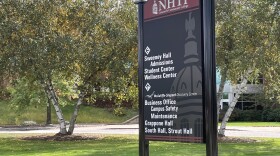Wayne Miller is known around Claremont for his work on addiction. He runs a local recovery center, and he has been instrumental in keeping support services in the community for those struggling with opioid use.
He can talk about addiction and recovery “left and right and sideways,” he says. But something he’d rarely spoken about in public before last year is race.
Editor's Note: We highly recommend listening to this story.
The first spark was an incident in January 2017. A selectboard member in Miller’s hometown — Hartford, VT — forwarded a racist image, which denigrated the Obamas and former US Attorney General Eric Holder, to a local newspaper writer.
The newspaper ran a story about the incident, and Miller decided to go to the Selectboard’s next meeting. The room was packed.
One by one, local residents stood up to address the board, describing discrimination and hate
Miller, a black man, noticed something immediately remarkable to him: lots of non-white faces. There were more people of color than he'd ever seen in one space in the Upper Valley.
One by one, local residents stood up to address the board, describing discrimination and hate they’d experienced in the community, and urging board members to take action.
“It was like a reawakening for me,” Miller said. “I felt more connected to the wider community, and to what really deep down is my community, than I had ever before while living here.”
Miller moved to the area as a kid, and for most of his life, he had dealt with racially motivated jeers, comments, and side-eyed glances on his own. He hadn’t spoken out about his experience. But now, seeing others equally frustrated, that was starting to shift.
Miller hadn’t planned to speak at the meeting, but he stood up to take his turn in front of the microphone. “I just want to say that I’m tired,” he began, describing the physical attacks he withstood as a child and urging change.

Then, later that year, reports came out about another incident, this time in Claremont, where Miller works. A young biracial boy had been seriously injured, hanged by a rope. Miller says he heard about it from the boy’s family, who said a group of white teenagers was responsible.
“I was outraged and disgusted and appalled and had a million questions, as everybody else did afterwards,” Miller said. The parallels to his own experience as a child hit hard, especially the physical violence. “l kind of took that as a sign,” he said.
It was a sign to Miller that it was time to step outside the world of addiction and recovery, where he’d been devoting the bulk of his time, and try to also make change on issues of race.
Many black children grow up here in communities where they are the only person who looks like them
He could rely on many of his existing skills — talking with people about what can be challenging, personal topics. And he could tap into the network of advocates he’d met at the Hartford Selectboard meeting earlier that year.
He decided to focus on mentoring, reaching out to local black children and young adults. “It directly ties into the work that I do already,” Miller said. “That is the whole point: that you’re not alone."
That message is critical, Miller said, because many black children grow up here in communities where they are the only person who looks like them. He’s calling his program “Living Proof.”

One of the women who spoke at the Hartford selectboard meeting is Sharonna Henderson. Her eight-year-old son, Hayden Dickinson, will be participating in Miller’s program.
A lack of diversity is a fact of life in the Upper Valley, she said, and she’s had to work hard to find a school where she’s comfortable Hayden will be safe and respected.
“If he visually can’t see anyone that looks like him, or anyone he could possibly connect with on that cultural level, then it is going to make it hard,” she said. “I know a lot of people don’t think that race comes into play with things like curriculum, but that’s wrong.”
She hopes connecting Hayden to a broader circle of black peers and mentors outside the house will help him embrace his history and culture. She, too, is considering joining the program as a mentor if her time allows.
Miller’s been talking to families like theirs across the Upper Valley and Burlington. He’s hoping to start pairing students with mentors in small groups to start this fall.







